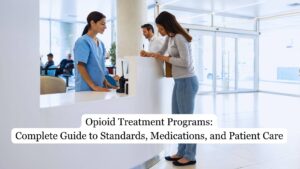Mental illness is something many people struggle with quietly, and if you are someone looking to get into addiction recovery, you may have already begun to understand how mental health influences your choices, your stability, and your overall well-being. Living in Idaho adds a unique layer to this because of how spread out the state is, resource limitations compared to other states, and how access to care can feel unpredictable.
In this article, we will examine what mental health actually means, what mental illness looks like, how to recognize warning signs early, and how to find support in Idaho even if you live far from major cities. Here you will learn about common mental health conditions, risk factors, protective factors, how addiction and mental illness interact, and simple steps to take care of your well-being. Most importantly, you will learn exactly where to turn for support and treatment in Idaho.
Mental illness should not be seen as a character flaw or a personal failing; it’s something that needs to be treated and is an adverse health consequence that cannot be controlled alone. Mental disorders are real health conditions, as real as any physical condition, that affect thinking, mood, behavior, and your stress responses. Instead of toughing out your symptoms or waiting until a crisis forces you to act, you need practical information that will help you make the right decision towards getting help. Whether you have been sober for a long time, are working through a different stage in your recovery journey, and are wondering if something deeper is going on beneath your struggles, you deserve to move forward with the clarity and confidence that comes with striving towards better overall health.
Quick Takeaways
- Mental illness is both common and treatable.
- Idaho residents face unique challenges, but support is available to those brave enough to take the first step towards recovery.
- Addiction and mental illness often occur together, which is known as a dual diagnosis or co-occurring disorder. Treatment works best when mental illness and addiction are addressed together.
- Early intervention prevents crisis and protects recovery.
Understanding Mental Health and Mental Illness: What Is Mental Health?

Mental health refers to your emotional, psychological, and social well-being. It is the part of you that helps you cope with stress, relate to others, manage your emotions, and make decisions. Mental health is also the measure of how you function in work, school, and daily life, and how you experience the world around you. Even if you are maintaining substance abuse sobriety and taking care of responsibilities, your mental state can shift quietly due to underlying causes. When left unaddressed, it can change how you feel and how you behave without you even realizing it.
What Is a Mental Health Condition?
A mental health condition, sometimes called a mental illness or mental health disorder, happens when changes in thinking, behavior, or mood become disruptive enough to affect your ability to function in your day-to-day life. Mental health conditions include:
- depression
- anxiety disorders
- bipolar disorder
- trauma-related conditions
- schizophrenia
These conditions may develop slowly or appear suddenly during times of stress, change or recovery. While a mental health diagnosis might seem scary, they are more common than you might think. According to the National Alliance on Mental Illness (NAMI), more than 1 in 5 adults experienced mental illness in 2024.
Why Mental Health Awareness Matters in Idaho
Idaho faces unique challenges that make mental health awareness especially important. Many communities are rural, with long distances between towns. This means there are generally fewer mental health professionals than can reasonably serve some areas, and the stigma around mental health makes people hesitate to go out of their way for help.
Idaho consistently ranks among states with higher rates of mental health concerns and lower availability of treatment. In its 2025 rankings, Mental Health America put Idaho in 48th place overall, with its adolescent ranking earning the same placement. Understanding mental illness and recognizing symptoms early is critical so individuals can get support before a crisis happens. Studies and data looking into the barriers for mental health treatment in Idaho have also been underserved, with a 2025 survey finding three main issues keeping Idahoans from getting optimal care:
- Service access
- Patient Complexity
- Resource Limitations
Prevalence and Impact of Mental Illness: The United States Perspective
Even though mental illness is much more common than people realize, people in the United States are being vastly underserved. NAMI estimated that in 2024, only a little over half of US adults with mental illness received treatment, with over 30% of adults with serious mental illnesses not receiving treatment during that same time. Anxiety, depression, and trauma-related disorders are among the most common. What compounds this problem is that many adults also experience both a mental illness and a substance use disorder at the same time. This overlap can complicate recovery if it is not addressed early.
Mental Health in Idaho
Idaho mirrors many national trends, but with added challenges. The state has high rates of depression, anxiety, and suicide, especially among rural residents and young adults who suffer from stress, social isolation, and a lack of access to care. People sometimes travel long distances to receive care or rely on telehealth. These barriers can delay diagnosis and create a sense of hopelessness for people who are struggling.
Addiction and Mental Illness Together
Mental illness and addiction often develop together. Some people begin using substances as a way to cope with untreated anxiety or depression. Others develop a mental health condition after years of substance use. When both issues occur simultaneously, this is known as a dual diagnosis. Treating one without treating the other usually leads to setbacks, confusion, or relapse. Understanding the connection between mental illness and addiction allows people in recovery to focus on their emotional health, not just sobriety.
Effects on Daily Life
Untreated mental illness changes how you work, parent, connect with others, and think about yourself. It may lead to:
- emotional distress
- withdrawing from people
- losing interest in things that once mattered
- getting overwhelmed easily
- feeling out of control emotionally
- For a person in drug recovery, these symptoms can increase the risk of relapse, especially if stress becomes difficult to manage. Recognizing symptoms early protects your well-being and your sobriety.
Common Mental Health Conditions

Now that the stakes and limitations of treatment have been discussed, we’ll examine how disorders commonly manifest and how professionals attempt to prevent mental health conditions from getting worse.
Depression
Depression is more than just sadness or a feeling of blue. It involves low feelings that stick around, hopelessness, loss of motivation, changes in sleep or appetite, difficulty concentrating, and withdrawal from people. For someone in recovery, depression may appear after the initial excitement of early sobriety fades. You may feel like you should be doing better, but something still feels off. This is a sign that you need help, not that you are failing.
Anxiety
Anxiety disorders include panic attacks, social anxiety, generalized anxiety disorder, and other patterns of excessive worry. People recovering from addiction often misinterpret anxiety as a regular part of stress. But when worry becomes constant or interferes with daily functioning, it becomes a mental health condition. Anxiety may cause restlessness, muscle tension, rapid heartbeat, sleep problems, and irrational fears.
Bipolar Disorder and Schizophrenia
These serious mental conditions involve significant mood changes, thought patterns, and behavior. Bipolar disorder includes periods of extreme energy and high mood followed by deep depression. Schizophrenia will involve hallucinations, delusions, or disorganized thinking. If these symptoms appear, especially in someone with a history of substance use, immediate evaluation is important because early treatment significantly improves long-term outcomes.
Trauma-Related Conditions
Trauma can change brain functioning and emotional patterns. Many people in addiction recovery have experienced trauma in childhood, relationships, or while using substances. Trauma-related disorders, such as post-traumatic stress disorder (PTSD), involve flashbacks, hypervigilance, nightmares, avoidance behaviors, and emotional numbness. Trauma-informed therapy is highly effective and available through Idaho mental health therapists.
Recognizing the Warning Signs

If you suspect yourself or a loved one might be developing a mental disorder, early intervention is critical to manage stress for everyone involved. Research reviews that the longer mental illness is left untreated, the harder reversing course becomes if the symptoms become long-lasting. Don’t worry about taking the perfect first step; just seeking social support for your mental disorder or offering support to someone you care about is scientifically proven to improve outcomes.
Emotional and Behavioral Clues
Mental illness is often subtle at first. People living with it may feel “off” without being able to pinpoint why. Look for warning signs such as:
- Persistent sadness, emptiness or irritability
- Feeling overwhelmed by simple tasks
- Difficulty handling stress
- Extreme mood changes
- Avoiding people or responsibilities
- Loss of interest in normally enjoyable activities
- Unusual anger or frustration
Red Flags for People and Family Members in Recovery
For individuals who have battled addiction, mental illness may show up as:
- Feeling triggered without a clear reason
- Losing interest in recovery activities
- Thinking about old habits or people
- Feeling overly tired or restless
- Wanting to isolate or withdraw
- Struggling with urges or cravings tied to stress
These signs indicate you or a loved one’s mental health may need attention, even if maintaining sobriety. Small acts can make the difference between seeking treatment and letting conditions continue to fester. There are also environmental factors that may influence symptom progression, which is why treatment in a structured environment away from triggers is recommended.
Crisis Versus Non-Crisis Situations
Non-crisis symptoms can be treated through therapy, medication or lifestyle changes while crisis situations require immediate help. Seek urgent support if you or someone you love experiences:
- Thoughts of self-harm or suicide
- Hearing or seeing things that others do not
- Severe panic or paranoia
- Inability to care for basic needs
Dial 988 for mental health emergencies anywhere in Idaho or visit the website to get resources and 24/7 statewide support. In the case of a medical emergency involving mental health or drug use, call for emergency services when the signs become clear.
Risk Factors and Protective Factors
There are several indicators and multiple levels that you can look for that can predict the development of a mental health disorder. Mental illness often develops due to a combination of influences, including:
- Genetic history
- Trauma or abuse
- Chronic stress
- Physical illness
- Substance use
- Family conflict
- Social isolation
- Major life transitions
- Experience of past violence
These factors do not guarantee mental illness, but they increase the likelihood of it occurring. For example, someone with a family conflict might withdraw socially and isolate themselves, causing them to develop a mental health disorder in the process.
Protective Factors
Protective factors are ways to reduce risk and make it easier to cope with stress. You can build protective factors gradually. Even one strong connection can make a meaningful difference.
Protective factors and mental health tips:
- Build stable relationships
- Increase access to therapy and emotional support
- Seek support from peers or recovery communities
- Get good sleep, nutrition, and physical activity
- Contribute to recovery with spiritual or cultural support
- Implement purposeful activities
- Develop strong coping skills
Mental health promotion is the practice of strengthening emotional well-being through lifestyle habits, early intervention, supportive environments, and social connection. It encourages people to take care of their mental health the same way they care for their physical health. In Idaho, mental health promotion often involves community support, peer specialists, and integrated behavioral health services that fit the state’s unique challenges.
Mental Health Promotion and Prevention: Everyday Actions That Support Mental Health

You do not need drastic lifestyle changes to start improving your mental health. Simple daily habits can create positive long-term effects, such as:
- Deep breathing several times a day
- Walking outside or moving your body
- Drinking enough water
- Joining a peer support meeting
- Limiting social media
- Practicing gratitude
- Talking openly with someone you trust
Prevention means acting early. If you notice anxiety increasing, depression deepening, or stress building, reach out before symptoms escalate. Prevention also includes avoiding old triggers, maintaining social connections, and continuing recovery routines even on difficult days.
How Mental Illness and Addiction Interact: Why They Often Develop Together
Many people begin using substances to escape emotional pain. Over time, substance use can change brain chemistry and make anxiety, depression, or trauma symptoms worse. People who struggle with both conditions often feel stuck because untreated mental illness can trigger relapse, and untreated addiction can worsen mental illness.
Awareness allows you to recognize when your emotional state is shifting and address it before it becomes overwhelming. By paying attention to mood, stress, and behavior, you can prevent issues from building quietly under the surface.
What Dual Diagnosis Treatment Looks Like
Dual diagnosis treatment addresses addiction and mental illness at the same time. It often includes therapy, medication management, support groups, and lifestyle planning. Integrated treatment gives people the best chance of long-term stability.
| Step | What Happens | Focus Of This Step | Your Role As The Patient |
|---|---|---|---|
| Initial contact | You call, walk in, or are referred to a program or provider. Basic safety and history questions are asked. | Make sure you are safe, gather basic info, and decide if urgent care is needed. | Be honest about current substances, meds, and any immediate risks like self-harm or overdose. |
| Screening for both issues | Short screeners for substance use and mental health symptoms are given. | Flag possible mental illness and substance use disorder together, not one at a time. | Answer openly about mood, anxiety, trauma, cravings, and use patterns. |
| Full assessment | A clinician takes a detailed history of substance use, mental health, trauma, medical issues, and supports. | Understand how addiction and mental illness interact in your life and why both must be treated. | Share examples of past treatment, relapses, and times you felt “off” even when sober. |
| Dual diagnosis confirmed | The team reviews your symptoms and may diagnose a substance use disorder plus one or more mental health conditions. | Put accurate names to what you are dealing with so treatment can be targeted. | Ask what each diagnosis means and how it affects recovery. |
| Stabilization and detox (if needed) | If substances are still in your system, you may go through medical detox or stabilization with meds and monitoring. | Safely reduce or stop substances so mental health symptoms can be seen more clearly. | Follow medical directions, report withdrawal symptoms, and stay engaged even if you feel overwhelmed. |
| Integrated treatment planning | One team creates a combined plan that addresses both mental illness and addiction at the same time. | Decide on setting (inpatient, outpatient), therapies, meds, peer support, and relapse prevention together. | Share your goals, fears, and preferences so the plan fits your real life, not an ideal version of you. |
| Therapy and skills work | You attend individual, group, and sometimes family therapy that target both disorders, such as cognitive-behavioral therapy (CBT), dialectical behavior therapy (DBT), and relapse prevention. | Change thinking patterns, learn coping skills, process trauma, and replace using with healthier behaviors. | Practice skills between sessions, show up consistently, and talk about what is and is not working. |
| Medication management | A prescriber may use meds for depression, anxiety, bipolar disorder, psychosis, or cravings, while monitoring side effects. | Stabilize mood and reduce symptoms so you can fully participate in therapy and recovery work. | Take meds as prescribed, report side effects honestly, and avoid stopping suddenly on your own. |
| Aftercare and relapse prevention | As intensive treatment ends, you shift to ongoing therapy, support groups, and a written relapse prevention plan for both conditions. | Maintain gains, catch early warning signs, and keep one coordinated view of your mental health and sobriety. | Keep follow-up appointments, update your plan when life changes, and reach out at the first sign of slipping. |
| 1Long-term recovery and wellness | You continue building a life that supports both mental health and sobriety through routines, community, and purpose. | Turn treatment gains into a sustainable lifestyle rather than a short-term project. | Use what you learned to manage stress, ask for help early, and stay connected to people who support your recovery. |
Therapy and Medication
Many mental health conditions improve with therapy, medication, or both. Cognitive behavioral therapy, dialectical behavior therapy, and trauma-focused therapies are common and effective. Clinicians use diagnostic criteria to understand the symptoms of both mental disorders and substance use disorders and recommend treatment.
Mental health recovery is an ongoing process that doesn’t always follow a narrow road. Regular therapy, check-ins to set goals, and personal wellness routines help maintain stability. Treatment works best when it becomes part of your everyday life. Caregivers should understand symptoms, treatment options, and how to offer supportive boundaries. Encouraging open communication strengthens the entire support system.
Taking Care and Finding Help in Idaho
Let’s look at some common resources you can find right here in the state.
Idaho offers support through:
- Idaho Department of Health and Welfare’s tool to find state crisis centers
- Crisis hotlines like 988 allow you to call or text 24/7
- Regional peer and family support programs
- Organizations like the Idaho Nonprofit Center, which offer resources for mental health crisis intervention
If you cannot access in-person therapy, telehealth is widely available and effective. Peer support groups provide encouragement, accountability, and understanding. These groups exist in person and online and are especially helpful for people managing both addiction and mental illness.
Mental Health Awareness Frequently Asked Questions
What is a dual diagnosis?
A dual diagnosis means having a mental health condition and a substance use disorder at the same time. This combination requires integrated treatment because addressing only one issue usually leads to relapse or worsening symptoms as the other remains untreated. Integrated care provides the best long-term recovery outcomes.
What symptoms indicate I may need mental health support?
Symptoms that suggest you may need mental health support include persistent sadness, overwhelming anxiety, irritability, loss of interest in everyday activities, changes in sleep or appetite, feeling disconnected from others, trouble concentrating, or constant stress you cannot manage. If these symptoms interfere with daily life or relationships, reach out for professional support.
What is mental health awareness?
Mental health awareness means understanding how mental health affects thoughts, emotions, and daily life, and recognizing the signs of mental illness early. It encourages open conversations, reduces stigma, and helps people know when to seek support. For those in addiction recovery, mental health awareness is critical because emotional struggles and untreated conditions can increase stress, trigger relapse, and interfere with long-term healing.
What should I do if I think someone I love is struggling?
If you think someone you love is struggling, approach them gently and without judgment. Let them know you care and are available to listen. You should encourage them to talk about what they’re feeling and suggest reaching out to a mental health professional or trusted support person. If there are signs of crisis or self-harm, contact emergency services or the 988 hotline immediately.
Raising the Bottom for Mental Health Treatment
Mental illness is something many people struggle with quietly, but you do not have to face it alone. Whether you live in a rural Idaho town, a growing city, or somewhere in between, there are resources, professionals, and communities ready to support you.
At Raise The Bottom, we are intimately familiar with Idaho’s specific challenges after 30 years of rehab and counseling experience. We offer multiple locations to create a recovery community that supports one another despite treatment obstacles.
Mental health awareness gives you the power to recognize symptoms early, take care of your emotional health, and stay strong in your recovery. You deserve support, you deserve understanding, and you deserve a full, healthy life. If you see signs of mental illness in yourself or someone you care about, reach out today. Asking for help is an act of strength and a step toward healing.






